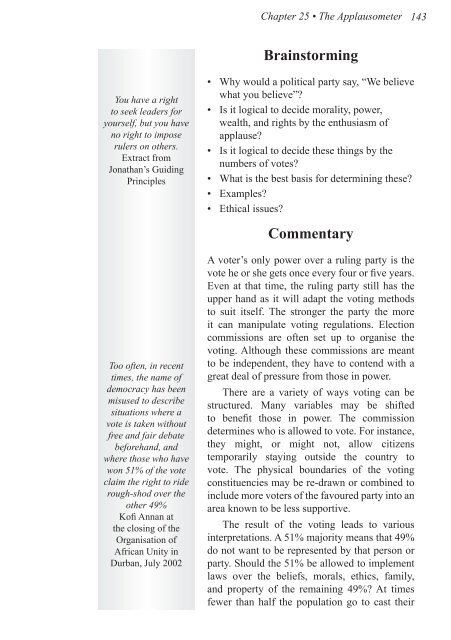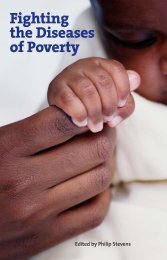The Adventures of Jonathan Gullible - Bastiat Institute
The Adventures of Jonathan Gullible - Bastiat Institute
The Adventures of Jonathan Gullible - Bastiat Institute
You also want an ePaper? Increase the reach of your titles
YUMPU automatically turns print PDFs into web optimized ePapers that Google loves.
You have a right<br />
to seek leaders for<br />
yourself, but you have<br />
no right to impose<br />
rulers on others.<br />
Extract from<br />
<strong>Jonathan</strong>’s Guiding<br />
Principles<br />
Too <strong>of</strong>ten, in recent<br />
times, the name <strong>of</strong><br />
democracy has been<br />
misused to describe<br />
situations where a<br />
vote is taken without<br />
free and fair debate<br />
beforehand, and<br />
where those who have<br />
won 51% <strong>of</strong> the vote<br />
claim the right to ride<br />
rough-shod over the<br />
other 49%<br />
K<strong>of</strong>i Annan at<br />
the closing <strong>of</strong> the<br />
Organisation <strong>of</strong><br />
African Unity in<br />
Durban, July 2002<br />
Chapter 25 • <strong>The</strong> Applausometer<br />
Brainstorming<br />
• Why would a political party say, “We believe<br />
what you believe”?<br />
• Is it logical to decide morality, power,<br />
wealth, and rights by the enthusiasm <strong>of</strong><br />
applause?<br />
• Is it logical to decide these things by the<br />
numbers <strong>of</strong> votes?<br />
• What is the best basis for determining these?<br />
• Examples?<br />
• Ethical issues?<br />
Commentary<br />
A voter’s only power over a ruling party is the<br />
vote he or she gets once every four or fi ve years.<br />
Even at that time, the ruling party still has the<br />
upper hand as it will adapt the voting methods<br />
to suit itself. <strong>The</strong> stronger the party the more<br />
it can manipulate voting regulations. Election<br />
commissions are <strong>of</strong>ten set up to organise the<br />
voting. Although these commissions are meant<br />
to be independent, they have to contend with a<br />
great deal <strong>of</strong> pressure from those in power.<br />
<strong>The</strong>re are a variety <strong>of</strong> ways voting can be<br />
structured. Many variables may be shifted<br />
to benefi t those in power. <strong>The</strong> commission<br />
determines who is allowed to vote. For instance,<br />
they might, or might not, allow citizens<br />
temporarily staying outside the country to<br />
vote. <strong>The</strong> physical boundaries <strong>of</strong> the voting<br />
constituencies may be re-drawn or combined to<br />
include more voters <strong>of</strong> the favoured party into an<br />
area known to be less supportive.<br />
<strong>The</strong> result <strong>of</strong> the voting leads to various<br />
interpretations. A 51% majority means that 49%<br />
do not want to be represented by that person or<br />
party. Should the 51% be allowed to implement<br />
laws over the beliefs, morals, ethics, family,<br />
and property <strong>of</strong> the remaining 49%? At times<br />
fewer than half the population go to cast their<br />
143





![[June 2008, Volume V Quarterly Issue] Pdf File size - The IIPM Think ...](https://img.yumpu.com/31747104/1/190x245/june-2008-volume-v-quarterly-issue-pdf-file-size-the-iipm-think-.jpg?quality=85)
